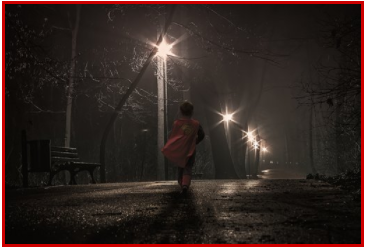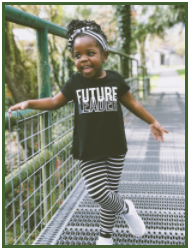Warning: The Dangers of Giving Young Women Great Communication Skills
Aug 04, 2021A Warning
I feel I should warn you: I work with a particular kind of practical magic - confidence and communication skills (they go hand-in-hand, always).
That makes me a kind of “Word Witch”, maybe.
Don’t let that freak you out: I promise I only use my skills and talents for good, not evil (also kinda like a superhero, just sayin’).

It makes me dangerous, though.
Why? It means I have access to power.
In fact, there is no greater power than confidence and communication skills.
I don’t care if you’re talking fists, or guns, or bombs - those are deadly, of course, but they are artificial, man-made (and YES, I did mean to say ‘man’-made) and not available to everyone.
Communication power is available to everyone.
Helen Keller made no excuses.
The Power
So I say “power”, but what do I mean?
Power:
the ability or capacity to do something or act in a particular way (https://www.lexico.com/definition/power)

In this specific case, it’s the power to communicate (which doesn’t just include speaking, btw!) with effectiveness and confidence.
It’s the capacity to evaluate the situations, the needs, the messages, and your own particular place within the entire context, and arrive at an effective communication approach that is authentic, engaging, and respectful.
OK, so we mean the “power to communicate”, but beyond the purely functional (loud, clear, accurate words, anxiety managed, etc), is there anything more to this power?
What is it about confidence and communication skills that constitute ‘power’?
It’s super-simple: this kind of power gives you the “capacity or ability to direct or influence behaviour of others or the course of events” (https://www.lexico.com/definition/power)
That’s some serious mic-drop shit.
It means you can advocate, promote, argue, debate, persuade, inform, tell your story, speak up for others, all the things, when you need to (and also where what, and how), based on your why.
Why Young Women in Particular?
Again, pretty obvious, I think: girls become young women who become older women, they are currently the majority shareholder of child-related responsibilities, whether it’s parenting or teaching.
Those are the two areas most directly linked to our collective future.
If we ensure that young women have the power to communicate AND the power to affect change, then we are putting power where it rightfully belongs - in the hands of those truly invested in the future.
To be clear: I am not advocating young men not having the same access.
I am advocating equal access (which does not currently exist).

Be Brave Like Merida
Research also shows that women are far more inclined to be counterphobic. No, that doesn’t mean we’re afraid of countertops or math: it means that women have a tendency to prefer or seek out a situation that is feared (Orbé-Austin & Orbé-Austin, 2020).
In other words, we’re braver.
Seriously - we head for the thing that scares us (which pretty much defines motherhood, IMO), knowing it’s going to be a challenge.

Huh.
We (being women) get caught up, however, with beasties like “Impostor Phenomenon” (a set of behaviours, not ‘symptoms’ - which is why I avoid “Syndrome”).
We do go towards the hard things, but we frequently doubt the veracity of our achievements/ success/ positive outcomes (even when we succeed, a significantly large percentage of the time).
So, we go towards the hard thing again, feeling like we need the ‘hit’ of achievement, but it never lasts, at least when Impostor Phenomenon is at play.
This has to do with our ability to internalize our achievements as part of our identity.
There are lots of theories about this, but it comes down to believing in one’s ability to be worthy/worthwhile.
I believe that the single biggest reason that women struggle with these ideas comes down to the power of communication and belief in the ability to affect change.
A Voice
Right. So all we have to do is teach young women to speak in public, yes?
Like, how to structure a talk, how to articulate clearly, how to maintain poise and presence?
Then everything’s good?
She’ll be confident, have great communication skills, bada-boom bada-bing, the world’s her oyster (mushroom, in the case of this photo ;-).

Maybe. Sometimes, if this kind of stuff gets developed at quite a young age.
And feeling competent in anything makes you feel more confident, more likely to step out, step up.
That much is generally true.
According to www.banbossy.com, girls’ self-esteem plummets 3.5 times more than boys’, from elementary to high school.
Once self-esteem starts to dive, it’s hard to catch it, harder to stop it, and even more difficult to reverse it. Can it be done?
Absolutely. But maybe we should look at preventing the situation in the first place.
For instance, girls are called on less in classrooms and interrupted more.
Sound like a Board meeting or Zoom meeting you’ve been to lately?
Of course, it does: the practice is normalized in the school environment, and males AND females expect (and enact) it in their adult lives, without being remotely aware that this dichotomy was set up when they were children.
So, we need to look at how our interactions with young girls and women reflect what we want them to know, believe, and do as communicators (which, from my perspective, is empowered and effective communication).
Great.
Another thing we need to look at is the systemic factors that keep women from seeing and hearing themselves as great communicators.
As Gill Whitty-Collins points out in her fabulous book, “Why Men Win at Work”, we internalize as ‘normal’ the things we see and hear around us, including the representations of what great leadership and communication look like.
If all women see are men (primarily white) in positions of power and influence, it simply compounds the first situation.
It is hard (though not impossible) to become the thing you cannot fully imagine.
Even our entertainment media does a terrible job of imagining the possibilities.
Giving airtime to both fictional and (more importantly) real-live women being great communicators and leaders is a pivotal approach to helping young women push through feelings of inadequacy, risk, and isolation (which are honestly communication-vibe killers).
Instead of ‘bossy’, we simply see and hear ‘boss’.
The Chicken or the Egg?
The hitch always comes when we start to think about the natural extension of this logic: should we start with girls nowadays, and let them push the envelope and change the systems as they progress?
Should we start with the systems now, so that when the girls grow up, they have a better chance?
For those of us doing this work, I think the answer is both, at the same time.
For the girls who become dangerous young women, they will soon enough become our allies in what often feels like a very steep, uphill, and lonely journey to push change.
If we start from both sides simultaneously, we might be in a position to pull them (younger women) ‘up’, while we’re all pushing change.
Young women who learn to be great communicators at an early age can frequently offset the Impostor Syndrome, confidence, and self-esteem issues that are manifestly present in so many older women around the world (and I count me as an ‘older’ woman, btw).
They start organizations, become formal and informal leaders, challenge norms and assumptions, and redefine for everyone what is ‘normal’ and ‘good’.
Not only this, but by school systems allowing for these young womens’ (and girls’) full expressive development, we are also setting expectations about how women will be treated in the larger social and employment contexts around us, now and in the future.
Win-win, no?

Yeah, But HOW?

You’ve heard it from me before, and you’re going to hear it again: we need to create awareness, community, support and choice.
The very simplest and most obvious first step is to take a long, hard look in the mirror: what do WE believe about women, great communication, and our own personal selves?
How are we playing into systemic practices that undermine the opportunities for all women to be heard (skilfully or not)?
Every woman’s journey in this space is different, of course - some of us go on to be TED talkers, government leaders, school teachers, mothers, community leaders, etc.
We have (and need to create) opportunities to communicate our perspectives and experiences (our stories, from the woman+ POV).
We need to stop conversations (and interruptions), hold space, advocate for others’ voices to be heard, and (where possible) let these others speak for themselves.
We need to support any and every effort that puts the development of girls’ communication skills front and centre. Do we need to keep asking ourselves “how can we do better”?
Because we can. We have to.
Go forth, be amazing.
xo dee
p.s. check out https://www.facebook.com/teewithd to follow and/or like the stuff I’m talking about, plus take the opportunity (while you’re there!) to join The TEEHouse, a wee group I’m starting to build to support and connect women interested in the sort of stuff we ‘serve’ at TEEwithD. Find me on LinkedIn at https://www.linkedin.com/teewithd to see when and where I’m speaking next. Check out weekly blogs/vlogs/podcasts, a fun quiz, reflection guide, and lots of sass on my Mother Ship: https://www.teewithd.com See you there! xoxo


